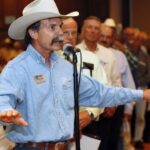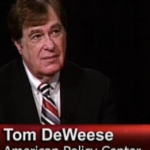The PPJ Gazette
Wisconsin: Establishing a legal objection to unlawful mandatory Premises registration
April 19, 2010 by Paul Griepentrog
![]()
by: Paul Griepentrog (c)copyright 2010 ALL RIGHTS RESERVED
__________________________________
Testimony to the Assembly Committee on Agriculture regarding AB 279
Voluntary Premises Registration
Whereas this committee has deemed it prudent to hold hearing on this issue at such a late date is in and of itself questionable. However the Judicial evolution of this issue has brought to light the immediate fact that the presumption of premises registration as a method of disease control to be false and misleading if not outright fraud.
By Paul McGraw’s own testimony we find that the program has not been a benefit in this or any other state for disease trace back and in fact could cause more time to be spent in a disease situation because of “false” registrations or faulty input of the premises number itself. Despite McGraw’s claim that the program was a benefit in the pseudo rabies outbreak in Clark County we find that the timeframe for addressing the farms within the given circumference as set forth by USDA was achieved even though 47 of the 54 farms with hogs were not registered.
Despite the exploitation of this event by the media there was no mention of the origin of the infected hogs. This selective approach of trace back is also manifesting itself within the dairy community even now.
Dairy cattle being brought in from Canada with RFID tags, on which the premises number is inclusive, the tags are being removed from the cattle and the cattle are sold to market for slaughter are not being checked for the required ear tattoo indicating their Canadian origin. These cattle enter the food system as US beef an act of mislabeling regarding their country of origin and then fraudulently being sold as such to US consumers.
When I questioned Duane Brander (DATCP Compliance Officer) about this he stated “that dairy was big business in Wisconsin” this despite continuing cases of BSE in Canada. Where is the real disease concern here? There is none!
As clearly depicted in a letter from Barbara Gronemus it was never the intent of the legislature to have a mandatory program, and as a matter of fact was a requirement agreed to by Sec. Nilsestuen’s application for grant moneys from the USDA.
“Funding to support NAIS Implementation”
Standard Form 424 (Rev.9-2003) Item 11
The form was signed by Rod Nilsestuen, Secretary of the Wisconsin Department of Agriculture, Trade and Consumer Protection on 12/18/06 and submitted to the USDA, APHIS, VS as part of the application for a Cooperative Agreement.
The USDA has declared by rule that participation in the NAIS is voluntary and that this rule preempts all State and local laws and regulations that are in conflict with it. 95.51, Wis. Stats. conflicts with the rule and is null and void.
“It is important to note that participation in the NAIS is voluntary.”
64647 Federal Register / Vol. 69, No. 215 / Monday, November 8, 2004 : Rules and Regulations
“This rule:
(1)Preempts all State and local laws and regulations that are in conflict with this rule;”
64648 Federal Register / Vol. 69, No. 215 / Monday, November 8, 2004
There can be no doubt that premises registration is directly tied to NAIS. DATCP admits that premises registration is part of NAIS in their response to Item 11 on the application for federal assistance which asks for a descriptive title of applicant’s project. Their statement on the form is:
“Funding to support NAIS Implementation”
Standard Form 424 (Rev.9-2003) Item 11
“The NAIS does not need to be mandatory to be effective; we believe the goals of the system can be achieved with a voluntary program.
“USDA, National Animal Identification System: A User Guide and Additional Information Resources (Dec. 2007) at p3.
“Producers can opt not to participate in the NAIS if they anticipate that the costs they will incur will exceed the benefits they receive from participation.”
64647 Federal Register / Vol. 69, No. 215 / Monday, November 8, 2004
______________
In that the US Supreme Court has ruled that grants are much in the nature of a contract it would be safe to assume that the WI Dept. of Agriculture has breached its agreement with the USDA and now becomes subject to Federal Administrative Relief which in turn may result in repayment of all moneys received under the program grant. A failure to remedy this situation will leave the citizenry no other choice but to move at law for relief.
In addition the wilful acts of entry onto private property by compliance officers without prior consent or warrant flies in the face of judicial process, especially when these entries are to inform individuals that they must register or be subject to prosecution for failing to register which borders on extortion. At Emanuel Miller’s evidentiary hearing Judge Jon Counsell questioned Paul McGraw regarding whether this program was an act of forced compliance, coercion, to which McGraw responded “No”, then Judge Counsell asked “Then what are we doing here today?” a question which Paul McGraw refused to answer, acquiescing by silence. Coercion in the execution of a contract is fraud and renders the contract null and void.
What in effect we are seeing here is the “compulsion” warned about by the US Supreme Court regarding the states pursuing Federal Grant Moneys. DATCP thumbed its nose at the legislature stating that they (DATCP) will not be micromanaged by the legislature. However it is the burden of the legislature to apply the will of the people and see that the original intent is observed and that these administrative agencies are held in check.
Paul McGraw testified that he did not know what type of database the premises registration information was stored in, despite his authorizing signature on the forms records management plan authorizing the information to be stored in an Oracle database and as per USDA instructions to house the database in Canada well beyond the protection of US privacy laws. The final dispersal of the information was done by McGraw’s acting agent, Robert Fourdraine CEO of the WLIC. The WLIC entered the information into the database in Canada.
Through open records request I discovered that my property had been registered twice without my knowledge or consent. This along with the properties being registered without the knowledge of the owner on which there is no livestock would lead any disease investigator on a merry goose chase and impede any time requirements set forth by the USDA.
Furthermore we find that the WLIC has members of the very tag manufacturers who would profit by the execution of this program creating a conflict of interest for all parties involved.
If the Committee wishes any documents supporting the claims made they can contact me at;
Paul M. Griepentrog
W2402 Shady Knoll Rd.
Park Falls, Wisc [54552]
715-762-1875
skfarms@centurytel.net



